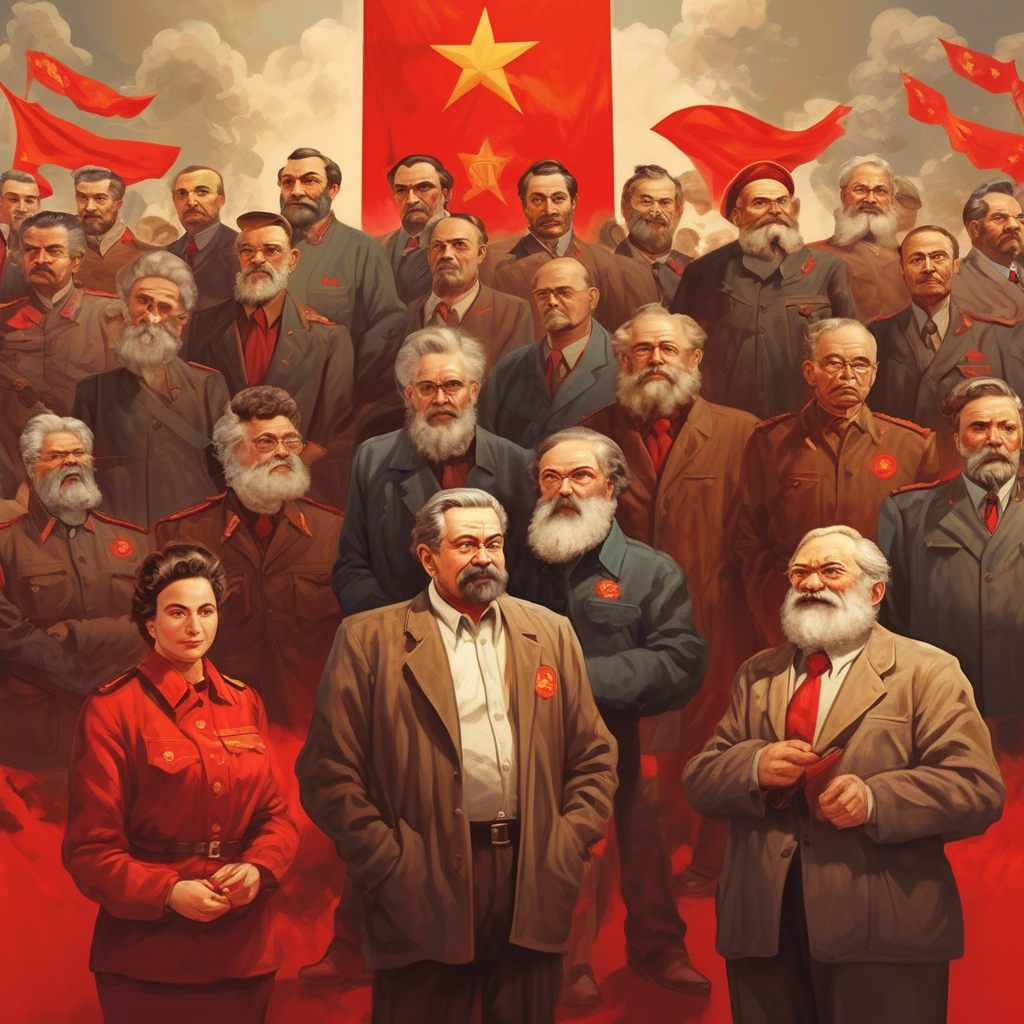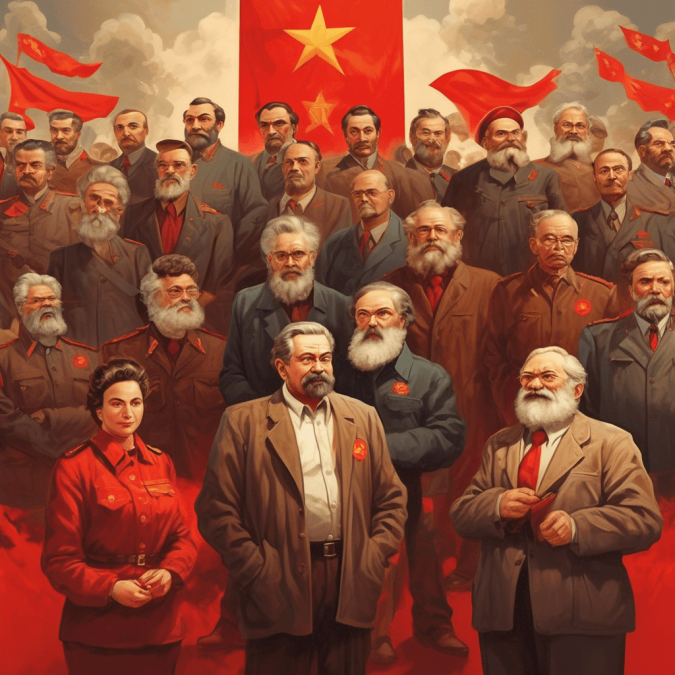
I. Introduction
Importance of studying the evolution of communist ideology
Understanding the evolution of communist ideology is crucial for comprehending the socio-political dynamics of the past and present. Communism has been a driving force behind revolutions, social movements, and governance systems, influencing the lives of millions of people worldwide. By studying the development of communist ideas, we can gain insights into the motivations, aspirations, and challenges faced by proponents of this ideology. Moreover, analyzing the successes and failures of communist systems can offer valuable lessons for shaping future political and economic policies.
II. Background
Definition of communism and its basic principles
Communism is a political and economic ideology that advocates for the establishment of a classless society where the means of production are owned collectively by the community. Central to communist theory are principles of social equality, economic justice, and the abolition of private property. Communism aims to create a stateless and egalitarian society where resources are distributed based on need rather than profit.
Key figures in the development of communist ideology
Key figures in the development of communist ideology include Karl Marx and Friedrich Engels, whose works laid the foundation for modern communism. Marx’s seminal work, “The Communist Manifesto,” outlined the principles of communism and called for the overthrow of capitalist systems. Other influential figures in communist thought include Vladimir Lenin, who led the Bolshevik Revolution in Russia, and Mao Zedong, who established communist rule in China.
Historical context of the emergence of communism
The emergence of communism in the 19th century was influenced by the social, economic, and political upheavals of the Industrial Revolution. The rise of industrial capitalism led to widespread exploitation of workers, social inequalities, and class conflicts, prompting calls for revolutionary change. The works of Marx and Engels provided a theoretical framework for understanding and addressing these issues, inspiring socialist and communist movements across Europe and beyond.
III. The Early Years: 19th Century
The roots of communist ideology in the works of Karl Marx and Friedrich Engels
Karl Marx and Friedrich Engels, in their collaborative works such as “The Communist Manifesto” and “Das Kapital,” laid the groundwork for modern communist ideology. They critiqued the capitalist system, advocated for the rights of workers, and called for the establishment of a proletarian-led society based on collective ownership of the means of production. Marx’s theory of historical materialism and class struggle formed the basis for understanding the dynamics of social change and revolution.
The publication of “The Communist Manifesto” in 1848
Published in 1848, “The Communist Manifesto” is a foundational text of communist theory that called for the overthrow of capitalist systems and the establishment of a communist society. The manifesto outlined the historical development of class struggles, the role of the proletariat in revolutionary change, and the goals of communism in abolishing private property, class distinctions, and exploitative labor relations. It became a rallying cry for socialist and communist movements around the world.
The rise of socialist movements in Europe
The 19th century witnessed the rise of socialist and communist movements in Europe, as workers, intellectuals, and activists mobilized for social and economic reforms. Socialist parties, trade unions, and revolutionary organizations emerged to challenge the status quo and advocate for workers’ rights, social welfare, and democratic governance. The ideas of Marx and Engels inspired a generation of reformers and revolutionaries who sought to transform society through collective action and solidarity.
IV. The 20th Century: Rise and Fall of Communism
The establishment of the Soviet Union under Lenin and Stalin
The Bolshevik Revolution of 1917 led by Vladimir Lenin marked the establishment of the Soviet Union, the world’s first socialist state based on Marxist principles. Lenin’s leadership in implementing socialist reforms, nationalizing industries, and redistributing land to peasants laid the foundation for a communist regime. His successor, Joseph Stalin, centralized power, industrialized the country, and implemented collectivization policies that transformed the Soviet Union into a global superpower.
The spread of communism to other parts of the world
Following the Russian Revolution, communist ideas spread to other parts of the world, leading to the establishment of socialist states in Eastern Europe, Asia, Africa, and Latin America. Communist parties and liberation movements gained prominence in countries like China, Cuba, Vietnam, and North Korea, as they sought to challenge colonialism, imperialism, and capitalist exploitation. The spread of communism sparked ideological conflicts and geopolitical tensions with Western powers.
The Cold War and the ideological struggle between communism and capitalism
The Cold War between the United States and the Soviet Union defined much of the 20th century, as the two superpowers engaged in a global ideological and geopolitical struggle. The ideological divide between communism and capitalism shaped international relations, military alliances, and proxy conflicts in regions such as Europe, Asia, and Latin America. The arms race, nuclear proliferation, and ideological propaganda characterized the Cold War era, leading to fears of nuclear annihilation and global instability.
The fall of the Soviet Union and the decline of communism in the late 20th century
The collapse of the Soviet Union in 1991 marked the end of an era for communism and the Eastern Bloc. Economic stagnation, political repression, and internal dissent contributed to the downfall of the Soviet regime, leading to the dissolution of the Soviet state and the emergence of independent republics. The fall of the Berlin Wall symbolized the end of communist rule in Eastern Europe, as countries transitioned to market economies and multiparty democracies. The decline of communism in the late 20th century signaled a shift in global politics and the triumph of liberal democracy.
V. Contemporary Communist Movements
The resurgence of communist ideology in the 21st century
In the 21st century, communist ideology has experienced a resurgence in response to growing income inequality, social injustices, and environmental crises. Communist parties, socialist movements, and anti-capitalist groups have emerged as vocal critics of neoliberalism, globalization, and corporate power. The Occupy Wall Street movement, the rise of left-wing political parties in Europe, and the popularity of socialist leaders in Latin America reflect a renewed interest in socialist principles and Marxist critiques of capitalism.
The influence of communist ideas on political movements and parties
Communist ideas continue to influence political movements and parties around the world, shaping debates on economic policies, social welfare, and democratic governance. Calls for wealth redistribution, public ownership of utilities, and workers’ rights resonate with a new generation of activists and intellectuals seeking alternatives to market capitalism. The legacy of Marx, Lenin, and other communist thinkers remains relevant in discussions on social justice, environmental sustainability, and global solidarity.
Challenges and criticisms faced by contemporary communist movements
Contemporary communist movements face challenges and criticisms from various quarters, including accusations of authoritarianism, economic inefficiency, and historical atrocities committed in the name of communism. Critics argue that centralized planning, state control, and one-party rule undermine individual freedoms, innovation, and human rights. The legacy of past communist regimes, such as the Soviet Union and Maoist China, looms large over contemporary movements, raising questions about the feasibility and desirability of socialist experiments in the 21st century.
VI. Case Studies
Examination of specific countries or regions where communist ideology has had a significant impact
Several countries and regions have experienced the influence of communist ideology with varying degrees of impact and outcomes. Case studies of China, Cuba, Vietnam, and North Korea provide insights into the dynamics of communist governance, economic development, and social transformation. Each country has unique historical contexts, political structures, and socio-economic challenges that shape the implementation and evolution of communist systems. Analyzing these case studies can shed light on the complexities and contradictions of communist experiments in different contexts.
Analysis of the successes and failures of communist systems in different contexts
The successes and failures of communists systems in different contexts offer valuable lessons for understanding the strengths and limitations of socialist governance. While some countries have achieved notable advances in literacy, healthcare, and poverty reduction under communists rule, others have grappled with corruption, inefficiency, and human rights abuses. The experiences of post-communist transitions in Eastern Europe, the reforms in China and Vietnam, and the ongoing challenges in Cuba and North Korea highlight the complexities of building sustainable socialist societies amidst global pressures and internal contradictions.
VII. Conclusion
Summary of key findings
The history and evolution of communists ideology reflect a complex interplay of ideas, movements, and historical events that have shaped the course of modern history. From the writings of Marx and Engels to the rise and fall of communist regimes in the 20th century, the trajectory of communism has been marked by revolutionary fervor, ideological conflicts, and socio-economic transformations. The resurgence of communists movements in the 21st century underscores the enduring appeal of socialist principles in addressing contemporary challenges of inequality, injustice, and environmental degradation.
Reflection on the evolution of communist ideology over time
The evolution of communist ideology over time reveals both the enduring relevance and the inherent contradictions of socialist principles. While the ideals of social equality, solidarity, and collective ownership continue to inspire activists and intellectuals worldwide, the historical record of communist experiments raises critical questions about the feasibility and sustainability of centralized planning, state control, and revolutionary change. Reflection on the evolution of communism invites us to critically engage with the legacy of past movements and envision alternative futures based on principles of justice, democracy, and sustainability.
Implications for the future of communist movements
The future of communists movements lies in their ability to adapt to changing global realities, address internal contradictions, and engage with diverse social movements for transformative change. As the world grapples with crises of inequality, climate change, and political polarization, communist ideas offer a critical lens for understanding the root causes of social injustice and envisioning alternative models of governance and economy. The resilience of communist movements in the face of historical setbacks and contemporary challenges points to the enduring relevance of socialist principles in shaping a more just and sustainable future for all.
